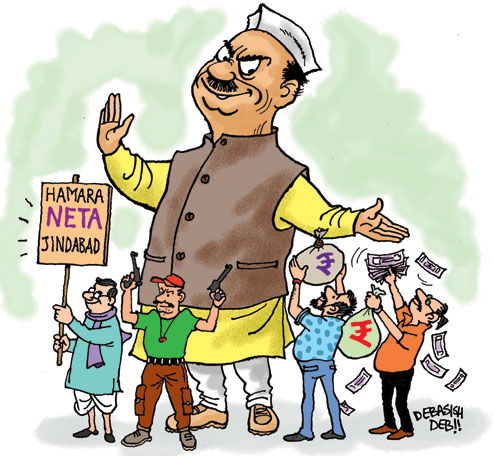Facts:
- Data from the Association for Democratic Reforms (ADR) indicate that 179 out of the 543 elected Members of Parliament in the present Lok Sabha have some kind of criminal case pending against them.
- In the case of over 100 MPs, the cases were of a very serious nature such as crimes against women and kidnapping. There seems to be very little improvement in this regard in the last five years.
- In the previous Lok Sabha (2009), 163 had criminal cases pending against them, many of which were of a serious nature.
- The profile of members of the Upper House is no better; of 228 members of the Rajya Sabha for whom data could be analysed, 20 have cases of serious crimes pending against them.
- Going by the ADR’s estimates, there are more than 1,500 MPs and MLAs in Parliament and State Assemblies with criminal cases pending against them.
Fast Track Courts:
- Centre to set up 12 Fast Track Courts to speed up trials of Legislators
- Details:
- The Supreme Court nodded for the Centre’s scheme to set up 12 fast track courts.
- These courts to exclusively prosecute and dispose of 1,581 criminal cases pending against Members of Parliament and State Legislative Assemblies within a year.
- These 1,581 criminal cases were declared by politicians in their nominations during the 2014 general elections.
- The States shall, in consultation with the High Court’s concerned, make the courts operational by March 1, 2018.
- The Supreme Court directed the High Courts, acting through the various trial courts, to trace out from the case records the criminal cases pending against politicians and transfer them to the special courts concerned for adjudication.
SC on criminalisation of politics:
Supreme Court has left it to Parliament to legislate on the issue of candidates facing criminal charges getting elected to Parliament and State legislative Assemblies.
- The court mentioned that it was not within its powers to disqualify politicians facing criminal cases from contesting election, but recommended that Parliament enact a strong law.
- However, the court made it mandatory for political parties and candidates themselves to make public disclosure through print and electronic media.
Will Political Parties act?
- No political party is free of this problem. The use of muscle power along with money power is a weapon used by all political parties to maximise electoral gains.
- In such a scenario, any move to ban candidates with a criminal record from contesting elections would mean political parties inflicting self-harm.
- While political parties raise concern about candidates with a tainted background contesting elections and getting elected, none of them come forward to set an example for others when it is time to act.

Role of Election Commission
- The issue is far more important and serious than the attention being paid to it by the policy makers.
- While the Election Commission has limited powers to legislate on such laws, it is only Parliament which can legislate to bring about the desired change.